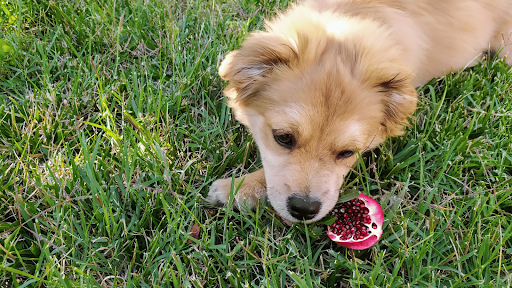Can Dogs Eat Pomegranate?
Posted by Volhard Dog Nutrition on May 31st 2023
Today's nutrition trends are all about the wonders of superfoods such as pomegranates. And for outstanding reasons! This Iranian shrub has flourished on the American continent ever since Europeans set foot in the New World. Its berries, packed with hundreds of edible seeds, are a blessing for our health, so much so that expert nutritionists are touting pomegranates as a key to longevity! It's no surprise that the ancients, in their wisdom, endowed this fruit with an aura of sacredness! Plus, we get to have a bit of fun popping the pomegranate eeds in our mouths!
The beauty of having a canine companion is in the act of sharing — joy, sadness, adventure, hardship ... and even superfoods! So, should dogs eat pomegranates, and if so, what precautions should dog owners take?
Can Dogs Eat Pomegranates?
Yes, dogs can enjoy the health benefits of pomegranate, but not without caution. The fruit itself is not toxic to dogs, so they can safely eat it in small quantities. The healthiest part of the fruit for dogs is the pretty pink fleshsurrounding the seeds called aril. It is jam-packed with sweet juices and super nutrients that could all benefit your dog's health!
What if My Dog Eats Too Much Pomegranate?
As with every ingredient in your dog's diet, it all boils down to moderation. The high amount of fiber and antioxidants in the pomegranate fruit and seeds can irritate your dog's gut. That is why eating too much of this fruit at once might cause an upset stomach, vomiting, and diarrhea. The risk of an intestinal blockage increases when feeding dried or dehydrated pomegranate.
Another reason why overfeeding pomegranates to dogs is discouraged resides in tannins, the chemical compound that keeps herbivores at bay. Ingesting too many tannins will result in poisoning and an unwanted trip to the vet!
Can Dogs Eat Pomegranate Skin?
Dogs must stay away from the pomegranate skin for multiple reasons: it is very tough, hard to chew, and almost impossible to digest due to its huge amounts of fiber. Furthermore, its hard texture might lead to bowel obstruction and even pose a choking hazard. And lastly, it's pretty unpalatable! Immediately contact your veterinarian if your dog has ingested any pomegranate skin.
Can Dogs Eat Pomegranate Seeds?
Dogs can technically eat pomegranate seeds, as they are completely non-toxic. Happy news, indeed, considering your dog's probably not exactly going to start munching the fruit and spit the seeds out!
The problem with pomegranate seeds is their hard texture, which a dog's digestive system isn't equipped to process. Therefore, you'll probably notice the seeds come right out exactly as they went in. The more pomegranate seeds they eat, the higher the chance of irritating the gut. Also, they can build up and cause bowel obstruction if there are too many.

Can Dogs Eat the Pomegranate Plant?
The topic of feeding the pomegranate plant is shrouded in speculation because there's no consensuson whether its flowers are edible or not. Nevertheless, we recommend that your dog stay away from the plant, even if it isn't poisonous. Munching away on plant matter can irritate their gut and cause gastrointestinal distress.
Can Dogs Drink Pomegranate Juice?
The same goes for pomegranate juice, which is safe for dogs to drink. However, it's packed with about 14 grams of sugar per 3.39 ounces of juice and potential ingredients such as xylitol, flavorings, and additives.
While it isn't going to immediately hurt your dog, eating too much of it will cause problems over time. Like in humans, eating too much sugar leads to poor oral health, especially in the absence of regular dental hygiene.
Excessive sugar consumption will also trigger diabetes in dogs. The stacks of sugar in pomegranate juice will also trigger spikes in your dog's blood sugar, leading to hyperactivity.
Some dog owners look to supplement their dog's diet with a splash of pomegranate juice, although there are healthier ways to provide those nutrients. Although pomegranates are famed for being incredibly rich in antioxidants, blueberries actually contain more. As a result, theyare perfectly safe for dogs to eat without posing a risk of causing stomach upset.
What are the Health Benefits of Pomegranates?
If there are two nutrients pomegranates pack in abundance, those are fiber and antioxidants. Fiber is an essential nutrient for your dog's gut and digestive tract health, regulating bowel movements and keeping stools properly consistent.
Antioxidants are the supernutrients responsible for protecting your dog's cells from free radicals, oxidative damage, and DNA alterations. With enough antioxidants in their diet, your dog will be adequately equipped to fight off chronic inflammation, heart disease, and certain cancers! Whichever part of the pomegranate you're feeding (e.g., arils or seeds), your dog is sure to get a healthy dose of this essential nutrient!
Research has uncovered that pomegranates might also alleviate the symptoms of joint pain. However, your dog would have to gulp down quite a few pomegranates for any tangible benefits, which might cause a stomach upset.
Finally, pomegranates are rich in two vitamins: vitamin C (an amazing help for your dog's immune system) and vitamin K (responsible for your dog's blood function and clotting). However, there's no need to include pomegranates into your dog's diet solely for these two nutrients, since they will only provide minimal supplementation to the canine body to naturally produce vitamins C and K itself.
How to Feed Pomegranates to Dogs
The wonders of pomegranates go well beyond their health benefits! This superfood allows for surprising versatility in how to feed it to your dog. You can turn them into smoothies with other dog-friendly ingredients, make "pupsicles" for the scorching hot summer days, or simply sprinkle raw pomegranate on your dog's food! Just be wary of how much pomegranate you feed to prevent upsetting your dog's stomach.

Your Dog Will Love a Bit of This Juicy Fruit in Their Diet!
Are you ready to spruce up your dog's diet with a superfood? Pomegranates have got it all: fiber, antioxidants, vitamins, and all sorts of other nutrients to keep your furry friend happy and healthy! Just be sure to feed only the aril and just a few pomegranate seeds if you wish to avoid any digestive issues. For more advice on dog nutrition, health, and training, make sure that you contact us and check out our blog!
Volhard Dog Nutrition and its expert nutritionists are now offering online consultations to help more dog parents discover why, what, and how to feed their dogs the healthiest of foods! Speaking to a Volhard nutritionist will help you understand the inseparable relationship between healthy food, a healthy body, and a healthy mind. If you're interested in contacting one of our Volhard nutritionists, don't hesitate to access our consultation page!

